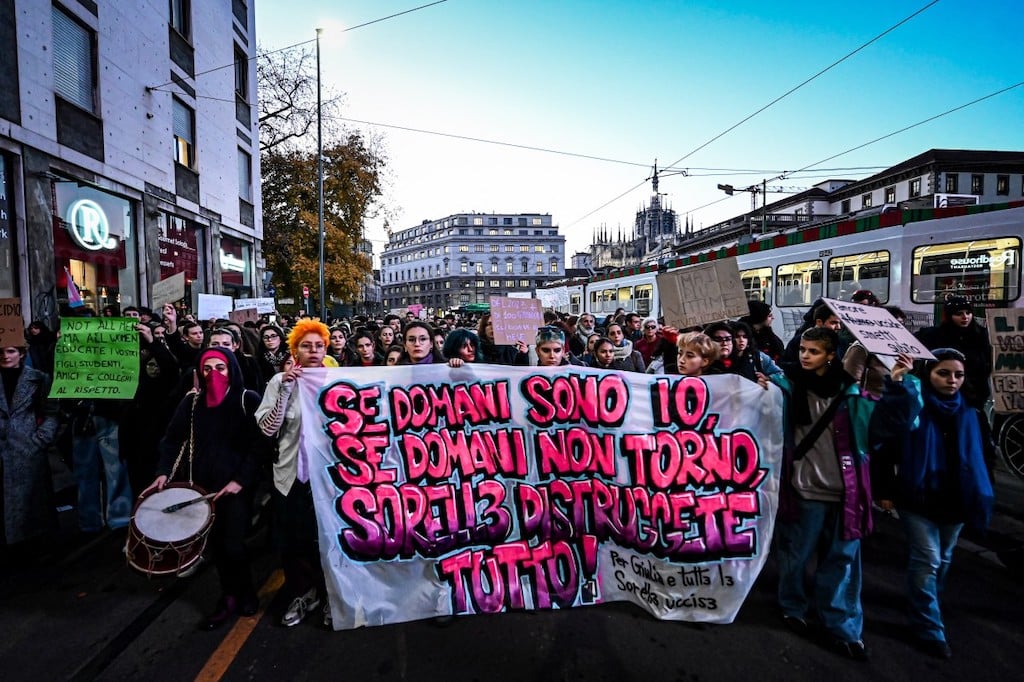Every night lately the evening news is once again flooded with reports on the most recent atrocious crime against a woman, dubbed in Italian ‘femminicidio’.
It’s a bit frustrating to see how the media treat these murders as if they were something always ‘new’ when they are actually really, really old. It’s like playing a broken record: each year so many women die in this way.
It’s as if all of a sudden people wake up and realise that there is too much violence against women, and policy-makers understand last-minute that they have to do something about it.
READ ALSO: Giulia Cecchettin: How Italy is facing up to gender violence after student’s murder
I remember when several years ago there was a big fuss over a new law against stalking, which apparently has led nowhere given the fact that violent crimes against women keep rising, with 105 killed so far this year according to the latest official data.
It is going to be really hard to overcome this problem, no matter how many laws or how many police procedures are put in place to prevent femminicidi.
The real issue is that such violence is still deeply ingrained in Italian society, particularly in the mentality of Italian men who have been accustomed for millennia to viewing women as inferior beings – be it their girlfriend, wife, mother or sister.
I was shocked a couple of days ago when, following the recent murder of yet another woman, I heard on the news that one young boy threatened to inflict upon his girlfriend the same ‘punishment’ if she did not shut up and behave according to his wishes. He told her “you will end up like she has, dead”. And this boy was just a teenager.
Few people know that up until as recently as 1981 Italian law envisaged the so-called delitto d’onore which allowed men to actually kill the woman or wife who had betrayed them with another man, or who had simply ‘attacked’ their reputation or ‘honour’, and receive a heavily reduced sentence.
In many areas in Italy, for example the deep south, it is no secret that fathers tend to be still very possessive of their daughters and of their wives.

I remember when my grandparents told me about this delitto when I was a little girl, it sounded like it was part of some kind of cruel mafia story. I thought it was just a crazy ritual that still survived in remote areas of Sicily or Sardinia.
But actually it was nationwide, and even though Italy had already approved the law in favour of divorce, the delitto d’onore was something still very much alive, and legal, until I was born.
So this makes me wonder how we can expect Italy’s new generations to think ‘violence free’, without stereotypes of gender against women.
Even though today’s youth was born after the abolishment of the Italian honor crime, it takes a long time for society to fully absorb such change and mould it into a new mindset.
READ ALSO: Italian schools to tackle ‘machismo and sexism’ after student’s murder
I still believe the key to changing the general mentality is by working on the young generations at an early stage, but even then, what kind of social ’rehab’ could be introduced remains a conundrum.
The recent announcements by the government about education programs in schools left me quite baffled. Do we need to see a woman die every day for the government to rethink key policies?
Unfortunately I believe this initiative is going to make little difference, at least in the short term. It sounds to me like too little, too late.
It really all comes down to the family, which is the nucleus of society, especially in Italy. If there is no social education within the home, then how can we expect teachers to deliver such education at school, where kids only spend a few hours per day?
If parents, and fathers and older brothers in particular, continue making ‘funny’ jokes about women or displaying biased gender views, I’m afraid things will never change.
Perhaps the only way is to empower women with more knowledge on how to pre-emptively recognise violent men and take action against them. It would also be extremely helpful to educate police authorities on how to speedily intervene at the appropriate moment without wasting precious days once a woman has made a stalking complaint.
The trouble is, as we so often see in news reports, and as I know from personal experience, too many cops are biased men with their own questionable attitudes towards women.



 Please whitelist us to continue reading.
Please whitelist us to continue reading.
Idiots like Andrew Tate don’t help with the issue either. The Australian Government from next year is funding a program called the “Healthy Masculinities Project”. It’s main objective is to combat the influence Andrew Tate has over young men, in particular with his brand of message with the way he views women. Unfortunately as long as there are hateful people like Tate with a huge following and his warped view of women, there will always be men who don’t respect women.